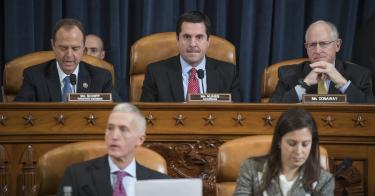Did Rep. Devin Nunes (R-CA) really have to threaten to hold FBI Director Christopher Wray and Deputy Attorney General Rod Rosenstein in contempt and to start impeachment proceedings? Apparently so.
Nunes chairs the House Intelligence Committee. For almost eight months, Wray and Rosenstein stalled his request for an unredacted copy of the memo that launched the Obama administration’s investigation/surveillance of the Trump campaign. Eight months.
But when Nunes threatened impeachment, he received the memo within 24 hours.
The Committee is investigating whether the Justice Department and the FBI (which is part of the Justice Department) had a credible, legal basis for opening their extraordinary investigation of a presidential candidate’s campaign. And the Justice Department has been trying to slow-walk the Committee’s investigation from the start.
But all the delaying tactics in the world can’t diminish the power of Congress to exercise oversight of a federal agency’s behavior -- or possible misbehavior.
In August 2017, the Committee subpoenaed Justice, demanding all documents associated with the opening of its “counterintelligence” operation examining Russian influence in the 2016 election. The subpoena covered the administration’s request, submitted to the FISA court, seeking surveillance warrants. The Justice Department, however, refused to provide an unredacted copy of the original FBI document that outlined its reasoning for opening the investigation.
In a 1975 case, Eastland v. U.S. Servicemen’s Fund, the Supreme Court said that the “scope of [Congress’s] inquiry … is as penetrating and far-reaching as the potential power to enact and appropriate under the Constitution.” That power, according to a 1957 Supreme Court decision, Watkins v. U.S., is at its peak when Congress is investigating “corruption, maladministration, or inefficiencies in the agencies of Government.”
Given that the Committee is looking into possible corruption in this investigation and/or maladministration of the statute governing the FISA court and the issuance of secret surveillance warrants, the oversight power of the Committee is at its height in this inquiry.
In an April 6 letter responding to Nunes’ latest demand for the unredacted memo, Assistant Attorney General Stephen Boyd didn’t directly address the demand. He did, however, generally try to justify the delay by citing “relevant legal precedents, the Department’s significant law enforcement and national security responsibilities, and Executive Branch confidentiality interests.”
Such excuses are not novel. A 2012 report by the Congressional Research Service notes that, for generations, Congress has sought “and obtained access to information concerning prosecutorial misconduct by Department of Justice officials” -- and that includes access to “pre-decisional deliberative prosecutorial memoranda.”
According to the congressional report, these demands are “often resisted” by Justice for many of the same reasons outlined by Boyd but are “usually released upon committee insistence.” That is because none of the reasons provided by Boyd provides a legal basis for refusing to turn over documents. Often Justice will also cave into Congress for political reasons such as nominations being held up or threats to withhold budget funding unless the demands are met.
Of course, the Justice Department may often have legitimate concerns about handing over documents central to an ongoing law enforcement investigation. They include avoiding prejudicial pre-trial publicity; protecting the rights of innocent parties and the identity of confidential informants; preventing disclosure of prosecution legal strategy and chilling of prosecutorial discretion; and precluding interference in the president’s duty to enforce the law.
But even when these concerns are legitimate, they do not give Justice the ability to deny Congress the documents lawmakers insist on seeing as part of an oversight investigation -- particularly one that questions the legitimacy of the actions taken by FBI and DOJ agents and lawyers.
The only constitutionally recognized way the Justice Department can protect such documents from disclosure is if the president claims executive privilege.
Executive privilege is the right of the president to protect the confidentiality of documents and internal executive branch communications from disclosure to the legislative and judicial branches of government. The constitutional concept of executive privilege first arose in 1792, when George Washington discussed with his cabinet how to respond to a congressional investigation into the disastrous defeat of General Arthur St. Clair in the Battle of Wabash. It was asserted most recently by former Attorney General Eric Holder in the congressional investigation of Operation Fast & Furious.
But neither President Trump nor Attorney General Jeff Sessions, and not even Rod Rosenstein, has ever asserted that any of the documents involved in the counterintelligence surveillance of the Trump campaign are covered by executive privilege.
Refusing to turn over this memo until threatened with contempt and impeachment is evidence of a Justice Department that refuses to recognize the legitimate authority of Congress to conduct oversight and investigate an executive branch agency.
Substantive questions have been raised: about the FBI’s possible reliance on unverified claims; about the use of opposition research paid for by a political opponent; and about the subsequent removal of various FBI and DOJ officials. Such questions lead one to wonder: Does the lack of cooperation mean that the FBI and Justice have something to hide? Let’s hope that not’s the case.
This piece originally appeared in PJ Media



